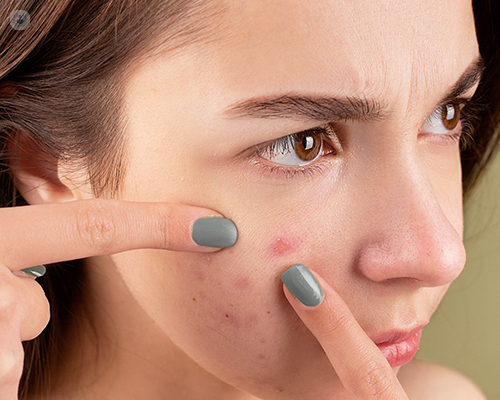Acne explained
Escrito por:Acne is a common skin condition which can often make people feel embarrassed or ashamed of their appearance. Esteemed consultant Dr Aadarsh Shah explains the causes, long-term effects and treatment of acne.
What is acne?
Acne is a skin condition which consists of having blackheads, whiteheads (comedones) and pus spots. Some people with acne also develop small cysts (fluid filled lumps). It most commonly affects the skin on the face, neck, back and chest.

Most people will have acne at some point in their life, most commonly in their teenage years but can exist into early adulthood. However, currently, we are seeing more patients develop acne for the first time in their late twenties and beyond. The majority won’t need any treatment but if the acne becomes severe, or is causing scarring on the face we would recommend treatment.
What causes acne?
On our skin, we have oil-producing glands (called sebaceous glands). In patients who have acne, these glands produce more oil which can be triggered by hormones. The lining of the skin pores can also become clogged with dead skin cells. The combination of clogging and increased oil blocks the pores, forming whiteheads and blackheads.
We all also have bacteria on our skin. A bacteria called cutibacterium acnes can overgrow in the oily glands which can then form swollen red spots.
The underlying causes of acne are often a combination of factors including hormonal, genetic and lifestyle factors. Aside from being driven by hormones, some medications and some supplements especially if they contain hormones (e.g. for building muscles) can cause or worsen it. Acne is also associated with some medical conditions, such as polycystic ovarian syndrome.
Certain diets have also been linked to acne, such as sugary foods and foods with high glycaemic index, as well as specific dairy products. Further studies are required to establish more in-depth information about the connection between acne and poor diet.
What are the symptoms long term effects of acne?
Those suffering from acne present with blackheads and whiteheads and may also experience pus-filled spots and cysts acne can be painful and tender.
After the redness from the spots settles down, you can be left with discolouration or pigmentation which can take a long time to fade. Additionally, acne can also leave scars on the skin which can be raised or indented. These scars can cause long-term damage which can be difficult to reverse.
Having acne can make people embarrassed and affect their self-esteem, meaning they may not want to go out and socialise. It can also negatively affect mood, causing patients to feel anxious. If you are suffering from acne, it is important to explain to your doctor how your skin affects you, both physically and emotionally.
Are there any tests for acne?
There is no test available to test for acne. It is diagnosed based on the history and how it appears.
Is there a cure for acne?
Although there is no cure, there are effective treatments which can help control it. The majority of people will grow out of it as they get older.
How can acne be treated?
Apart from using products available over the counter, there are also medical treatments which can be given with a prescription. These can be categorised into:
- Topical treatments: these are applied to the skin to the areas of acne
- Tablet antibiotics
- Isotretinoin tablets
- Tablets that target hormones
Most treatments will take at least 3 to 4 months for the patient to see a significant improvement in their skin’s condition.
Most medically prescribed treatments work to control acne. However, you may need further treatments for scarring once the acne has been controlled. There are a variety of treatments for scars depending on the size and type of scar and your dermatologist will be able to advise you on this.
What can I do whilst I wait to see a dermatologist?
Below is some advice on what to do if you’re suffering from acne.
- If you are getting scarring or pigmentation you should see a dermatologist as soon as possible in order to prevent long-term skin issues.
- Try to use oil-free and ‘non-comedogenic’ cream and minimise make-up use so that your pores do not get more clogged.
- Cleanse your skin with a gentle cleanser or oil-free soap especially if you wear make- up in the day.
- Exfoliate your skin but avoid scrubbing too much as this can irritate your skin.
- Try to avoid touching your face during the day as this can make acne worse.
- Avoid picking or squeezing your spots as this can cause scarring and pigmentation.
If you are suffering from acne and would like to book a consultation with Dr Shah, do not hesitate to do so by visiting his Top Doctors profile today


